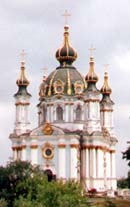 |
Vol 2, No 10
13 March 2000 |
|
|
 C E N T R A L E U R O P E A N N E W S: C E N T R A L E U R O P E A N N E W S:
News Review for Ukraine All the important news from Ukraine since 5 March 2000 Natalya Krasnoboka 81 miners were killed in an explosion at the Barakova coal mine in Krasnodon in the Luhansk region on 11 March. The miners were working more than 650 metres below the surface at the time of the blast. This was the worst mining disaster in the country in decades of mining accidents which have seen hundreds - if not thousands - killed. Both the President and the Prime Minister cancelled planned trips abroad, and a state commission will investigate the cause of the explosion. Political and economic processes in Ukraine continue to attract the attention of European and international organisations. Along with the Council of Europe's dissatisfaction with Ukraine's planned 16 April referendum, the IMF still has doubts about the proper use of its loans by the Ukrainian government. An international audit of the National Bank of Ukraine was launched earlier this year after the publication of an article in the Financial Times (28 January 2000) concerning the misuse of IMF funds in the period between December 1997 to January 1998. In the article, the Financial Times relied on the statement of Pavlo Lazarenko, former Ukrainian prime minister, who said that USD 613 million of IMF funds were transferred by the National Bank of Ukraine in December 1997 and invested in risky enterprises. Although on 7 March, the Ukrainian central bank was ready to report that the newspaper's allegations had not been confirmed, the IMF's recent investigation in Kyiv proved to be only the first part of a complete audit. Almost at the same time that the IMF preliminary investigation was finished, the World Bank launched a second audit of the Ukrainian Finance Ministry concerning its loans to Ukraine since 1994. Explaining their action, the World Bank's representatives say that they are almost sure of the proper use of World Bank funds, however, "the World Bank wants 'to take advantage' of the ongoing audit to check its own loans, too," Radio Free Europe reported. For its part, the Council of Europe has kept an eye to Ukraine's final decision concerning the legitimacy of the 16 April referendum [See this week's accompanying article for more on the referendum issue]. This week, the monitoring committee of the Council, following a meeting in Paris, adopted preliminary recommendations on this issue and asked Kyiv to cancel the referendum. The decision was made following the speech of Hanne Severinsen, Council of Europe's commissioner, who recently came back from Kyiv. The Council of Europe does not agree with Ukraine's intent to make changes in its Constitution by means of referendum nor with the nature of the referendum. Although the organisation is still awaiting the result of its Venetian commission, its disapproval seems clear enough. This week, young people in Ukraine seemed to disprove the predominant concern about the political apathy of modern youth. On 9 March, 11 young people between the ages of 19 and 24 calling themselves representatives of the organisation Independent Ukraine seized the headquarters of the Communist Party of Ukraine in Kyiv and occupied it until the beginning of the next day. Among the main demands of the group is the ban of the Communist Party in Ukraine, withdrawal of the Russian fleet from Crimea and Ukraine's withdrawal from the CIS. The young people are ready to appear before a court, hoping that the public trial against their actions will be transformed into a political Ukraine-wide trial against the Communist Party. A day later, on 10 February, young Ukrainian Communists called a press conference to announce the creation of the Ukrainian Communist Union of Youth. Young Communists claim that they do not support any of the existing or past political forces in Ukraine, including the Communist Party, and that they come to deliver renewed Communist ideas. The State Statistics Committee reported early in the week that the country's industrial output grew by 14.7 per cent last month compared with February 1999. The situation has also improved in the area of wages. In comparison with 1998, the average salary has grown by 15.7 per cent to UHR (Ukrainian hryvny) 177.52 (around USD 32). During the last year, 40 per cent of employees earned wages ranging from UHR 74 to UHR 150, every eighth employee received UHR 150 to UHR 195. Despite all of the political and economic difficulties, last week in Ukraine was primarily marked by International Women's Day. This formerly deeply political holiday remains one of the most popular holidays in the country. In the past, deprived of regular "bourgeois" holidays such as St Valentine's Day and Mothers' Day, Ukrainians attempted to combine celebrations of love and spring under the label of "International Women's Day," originally intended as a day of struggle for women's rights. Nowadays, having a chance to celebrate the "day of love" on 14 February with the rest of the world, Ukrainians nevertheless continue to celebrate International Women's Day, which is recognised as an official state holiday. Natalya Krasnoboka, 11 March 2000 Sources: For more on the Barakova mine tragedy see the BBC Report for 12 March
|
|
![]()
Copyright ©
2000 - Central Europe Review and Internet
servis, a.s.
All Rights Reserved